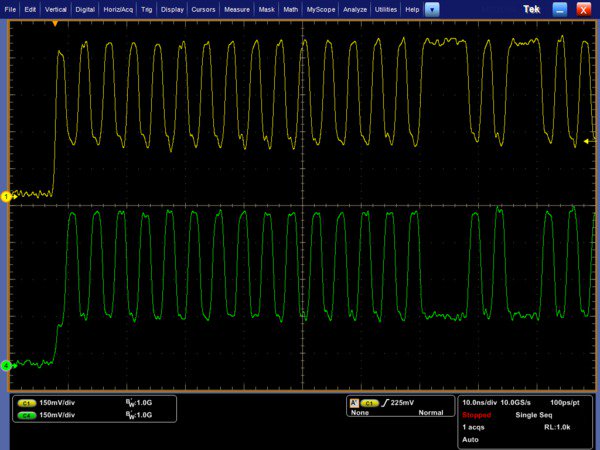
연락처
텍트로닉스 담당자와 실시간 상담 6:00am-4:30pm PST에 이용 가능
전화 문의
9:00am-6:00PM KST에 이용 가능
다운로드
매뉴얼, 데이터 시트, 소프트웨어 등을 다운로드할 수 있습니다.
피드백
Mixed Signal Oscilloscopes
MSO5000B, DPO5000B Series Datasheet
This instrument will be replaced by the 5 Series MSO. Learn about the 5 Series MSO.
Please note, the supply of MSO/DPO5000B Series Oscilloscopes is limited. New 5 Series MSO oscilloscopes are the recommended replacements for the MSO/DPO5000B Series. Learn about the new 5 Series MSO Oscilloscopes.
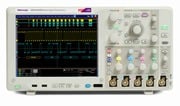
Designing with today’s faster data rates and tighter timing margins requires an oscilloscope with outstanding signal acquisition performance and analysis capabilities. Tektronix MSO/DPO5000B Series oscilloscopes provide exceptional signal fidelity, with 2 GHz bandwidth and 10 GS/s sample rate, along with advanced analysis and math capabilities, on your bench and in your lab. Run Windows®-based analysis software right on the oscilloscope. Point and click Visual Triggers enable you to capture complex signals with ease. MSO models include 16 digital timing channels, and all models can be equipped to decode common serial protocols, providing a comprehensive view of your systems.
Key performance specifications
- 2 GHz, 1 GHz, 500 MHz, and 350 MHz bandwidth models
Up to 10 GS/s real-time sample rate on one or two channels and up to 5 GS/s on all four channels
- Up to 250 Megapoint record length with MultiView zoom™
- >250,000 wfms/s maximum waveform capture rate with FastAcq® acquisition
- FastFrame™ segmented memory acquisition mode with up to 290,000 segments and >310,000 waveforms per second capture rate
- Standard 10 MΩ passive voltage probes with less than 4 pF capacitive loading and 500 MHz or 1 GHz analog bandwidth
- >11 bits vertical resolution using HiRes sampling
- User-selectable bandwidth limit and DSP filters for lower noise and better measurement accuracy
Key analysis features
- Wave inspector® controls provide easy navigation and automated search of waveform data
- Suite of advanced triggers, with standard Visual Trigger and Search
- 53 automated measurements, selectable filtering, waveform math and FFT analysis
- Waveform histogram, eye diagram, TIE (jitter/timing) measurement and analysis
- User-definable math using MATLAB, Visual Studio and Excel
- Optional analysis for memory, advanced jitter, serial data, power and Wideband RF
Key protocol features
- Trigger and decode options for mid-speed (100 Mb/s to 1 Gb/s) buses
- Trigger and decode options for low-speed (<10 Mb/s) buses
- Compliance test options for USB2.0, Ethernet, USB power, MOST, and Automotive Ethernet
- Mask testing on communication, computing and video standards
Mixed signal design and analysis (MSO Series)
- 16 digital channels (user upgradeable)
- MagniVu™ high-speed acquisition provides 60.6 ps timing resolution on all digital channels
- Automated triggering, decode, and search on parallel buses
- Per-channel threshold settings
See the performance difference
With up to 2 GHz analog bandwidth and sampling rates up to 10 GS/s, the MSO/DPO5000B series ensures you have the performance you need to capture waveforms with the best possible signal fidelity and resolution for seeing small waveform details.

Performance - With up to 2 GHz bandwidth and 10 GS/s sample rate capture USB2.0 480 Mb/s differential signals with true fidelity and 100 ps resolution.
Accurate high-speed probing
The TPP Series probes, included standard with every MSO/DPO5000B Series oscilloscope, provide up to 1 GHz of analog bandwidth, and less than 4 pF of capacitive loading. The extremely low capacitive loading minimizes adverse effects on your circuits and is more forgiving of longer ground leads. And with the probe's wide bandwidth, you can see the high frequency components in your signal, which is critical for high-speed applications. The TPP Series passive voltage probes offer all the benefits of general-purpose probes like high dynamic range, flexible connection options, and robust mechanical design, while providing the performance of active probes.

Probing - Up to 1 GHz bandwidth and less than 4 pF capacitive loading provides active probe performance and superior performance over passive probes included with other mid-range oscilloscopes.
Fast discovery
To debug a design problem, first you must know it exists. Every design engineer spends time looking for problems in their design, a time-consuming and difficult task without the right debug tools. The MSO/DPO5000B Series offers the industry's most complete performance to capture and isolate events, providing fast insight into the real operation of your device. Tektronix proprietary FastAcq® technology delivers a fast waveform capture - greater than 250,000 waveforms per second - that enables you to see glitches and other infrequent transients within seconds, revealing the true nature of device faults. A digital phosphor display with color intensity grading shows the history of a signal's activity by using color to identify areas of the signal that occur more frequently, providing a visual display of just how often anomalies occur across all channels.
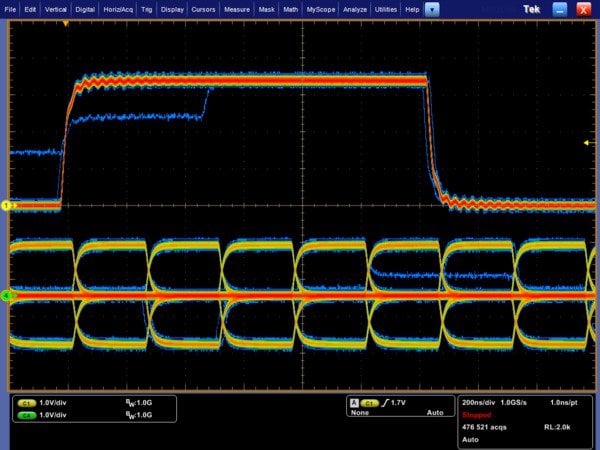
Discover – fast waveform capture rate - over 250,000 wfm/s - maximizes the probability of capturing elusive glitches and other infrequent events.
High vertical resolution
If the measurement requirement is to capture high-amplitude signals while seeing smaller signal details, the MSO/DPO5000B provides the acquisition flexibility needed to capture the signals of interest while removing the effects of unwanted noise. With HiRes acquisition vertical resolution can be increased to over 11 bits while reducing signal noise. Signal fidelity can be further increased by using channel input filters or applying a wide choice of DSP filters.

Capture - HiRes acquisition - increased vertical resolution to >11 bits while removing noise on a 650 V Pk-Pk signal while seeing the smaller details of less than 1 V Pk-Pk with or without apply low-pass filtering.
Long record length
With up to a 250 M point record length, you can capture many events of interest, even thousands of serial packets, in a single acquisition for further analysis while maintaining high resolution to zoom in on fine signal details. For complex analysis like Time Interval Error (TIE) measurements the longer record length ensures you have enough data captured for handling clock recovery and creating jitter profiles. Unlike other oscilloscopes in its class, the MSO/DPO5000B provides flexible setup of both record length and sampling rate to ensure optimum resolution.
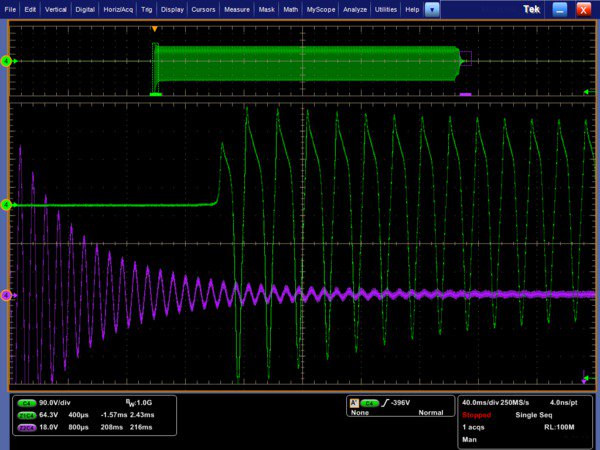
Capture - 100 Meg point acquisition with HiRes acquisition - increase vertical resolution to >11 bits with dual zoom of waveform details.
Segmented memory
For more efficient data capture, partitioning of memory can extend the total time captured. FastFrame™ Segmented Memory mode enables you to select up to 290,000 memory segments with a trigger capture rate of over 310,000 triggers per second. Beyond memory flexibility, segments are time stamped and can be viewed individually or as an overlay and analyzed using advanced features like protocol decoding. Signals captured with FastFrame™ can also be post-processed using waveform averaging or envelope mode.
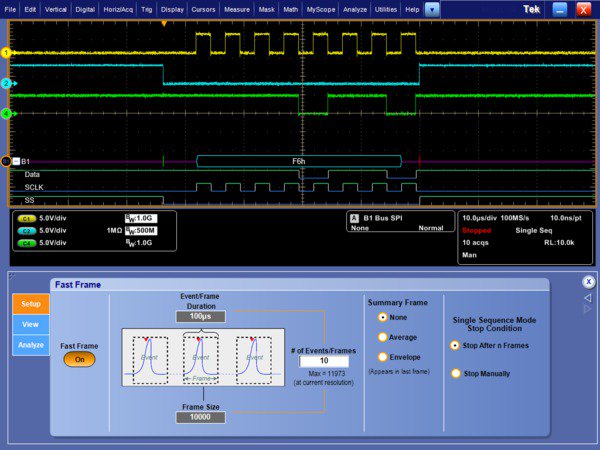


FastFrame™ - User selectable memory segments allow for efficient memory management with time stamped capture of SPI bus data along with analysis of serial bus decoding on multiple data packets. Frames 1, 2, and 9 are shown here.
Mixed signal design and analysis (MSO Series)
The MSO5000B Series mixed-signal oscilloscopes provide 16 digital channels. These channels are tightly integrated into the oscilloscope's user interface, simplifying operation and making it possible to solve mixed-signal issues easily. MSO functionality can also be added later as a user upgrade.
Color-coded digital waveform display
The MSO5000B Series has redefined the way you view digital waveforms. One common problem with other mixed-signal oscilloscopes is determining if data is a one or a zero when zoomed in far enough that the digital trace stays flat all the way across the display. To avoid this problem, the MSO5000B Series has color-coded digital traces, displaying ones in green and zeros in blue.
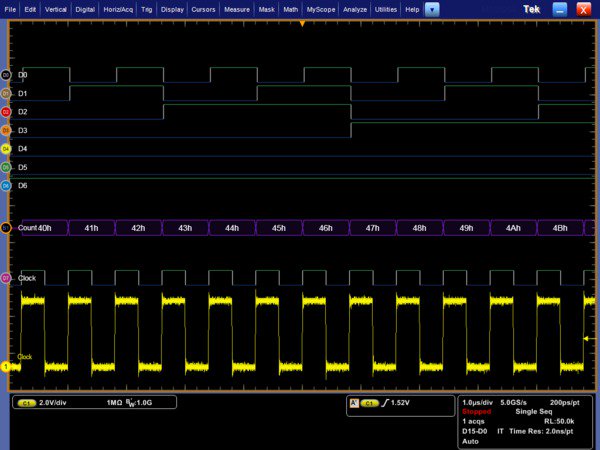
With the color-coded digital waveform display, low values are shown in blue and high values are shown in green, enabling instant understanding of the bus value whether transitions are visible or not.
The multiple transition detection hardware of the MSO5000B Series will show you when the system detects more than one transition. This indicates that more information is available by zooming in or acquiring at faster sampling rates. In most cases zooming in will reveal a glitch that was not viewable with the previous settings.
MagniVu™ high-speed acquisition
The main digital acquisition mode on the MSO5000B Series will capture up to 40 M points at 500 MS/s (2 ns resolution). In addition to the main record, the MSO5000B provides an ultra-high-resolution record called MagniVu which acquires 10,000 points at up to 16.5 GS/s (60.6 ps resolution). Both the main and MagniVu waveforms are acquired on every trigger and either can be displayed at any time, running or stopped. MagniVu provides significantly finer timing resolution than comparable mixed-signal oscilloscopes on the market, instilling confidence when making critical timing measurements on digital waveforms.
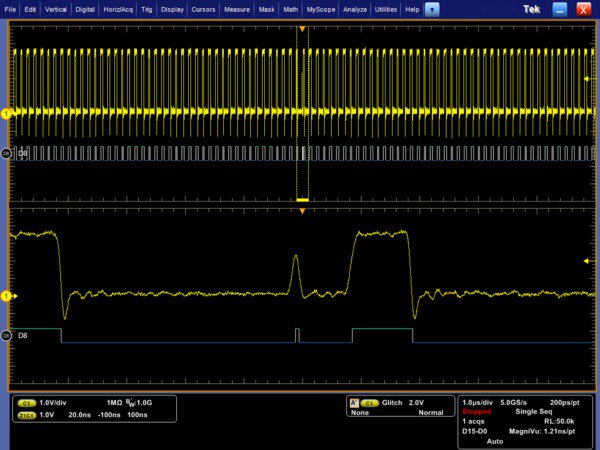
The MagniVu high-resolution record provides 60.6 ps timing resolution, enabling you to make critical timing measurements on your digital waveforms.
Versatile trigger and search
Discovering a device fault is only the first step. Next, you must capture the event of interest to identify root cause. The MSO/DPO5000B Series provides a complete set of triggers - including runt, glitch, width, timeout, transition, pattern, state, setup/hold violation, serial packet, and parallel data - to help quickly find your event.
Visual trigger
Finding the right characteristic of a complex signal can require hours of collecting and sorting through thousands of acquisitions for the event of interest. Defining a trigger that isolates the desired event and shows data only when the event occurs speeds up this process. Visual Trigger and Search makes the identification of the desired waveform events quick and easy by scanning through all waveform acquisitions and comparing them to on-screen areas (geometric shapes). Areas can be created using a variety of shapes including triangles, rectangles, hexagons, trapezoids, and user-specified shapes to fit the area to the particular trigger behavior desired. Set up to eight areas and condition based on Boolean logic conditions.
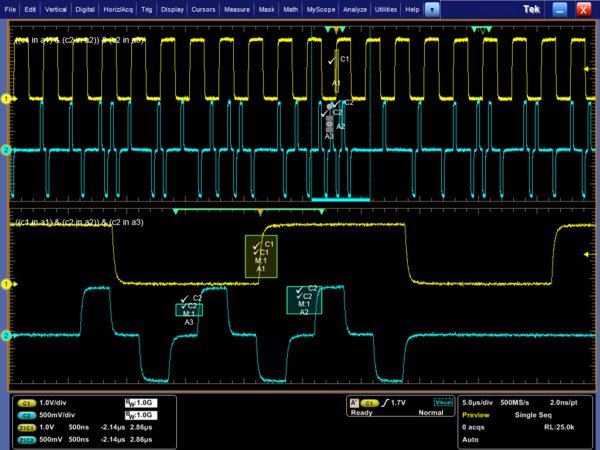
Visual Trigger- Capture signals on two channels with Visual triggering with multiple defined areas and markers showing repeat occurrences.
Navigation and search
Finding your event of interest in a long waveform record can be time consuming without the right search tools. With today's record lengths pushing beyond a million data points, locating your event can mean scrolling through thousands of screens of signal activity.
The MSO/DPO5000B Series offers the industry's most comprehensive search and waveform navigation with its innovative Wave Inspector® controls. These controls speed panning and zooming through your record. With a unique force-feedback system, you can move from one end of your record to the other in just seconds. User marks allow you to mark any location that you may want to reference later for further investigation. Or, automatically search your record for criteria you define. Wave Inspector will instantly search your entire record, including analog, digital, and bus data. Along the way it will automatically mark every occurrence of your defined event so you can quickly move between events. The standard Advanced Search and Mark capability of the MSO/DPO5000B Series can even search for up to eight different events simultaneously and stop a live acquisition when it finds an event of interest, saving even more time.

Search - Results of an advanced search for a runt pulse or a narrow glitch within a long waveform record.
Comprehensive analysis
Verifying that your prototype's performance matches simulations and meets the project's design goals requires analyzing its behavior. Tasks can range from simple checks of rise times and pulse widths to sophisticated power loss analysis, characterization of system clocks, and investigation of noise sources. The MSO/DPO5000B Series offers a comprehensive set of integrated analysis tools including waveform- and screen-based cursors, 53 automated measurements, advanced waveform math including arbitrary equation editing, waveform histograms, and FFT analysis.
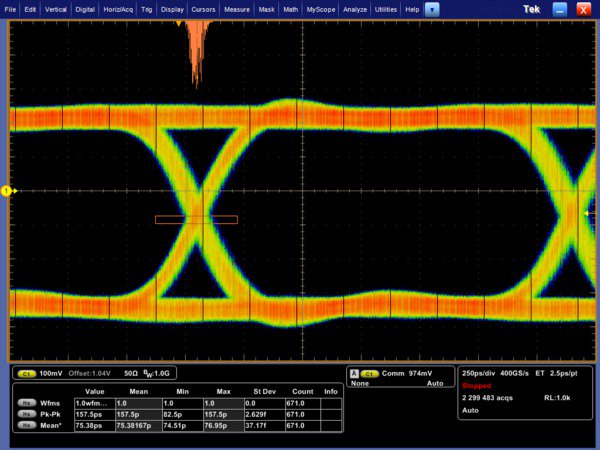
Analyze - Waveform histogram of the rising and falling edge of a 622 Mb/s signal showing the distribution of edge position (jitter) over time. Included are numeric measurements made on the waveform histogram data.
The standard limit test package enables long-term signal monitoring, characterizing signals during design, and production line testing. Limit test compares a tested signal to a known good or "golden" version of the same signal with user-defined vertical and horizontal tolerances. You can tailor a limit test to your specific requirements by defining test duration in a number of waveforms, setting a violation threshold that must be met before considering a test a failure, counting hits with statistical information, and setting actions upon violations, test failure, and test complete.
Custom analysis
When signal analysis needs extend beyond the standard or optional analysis features, the Microsoft Windows 10 based MSO/DPO5000B series has the flexibility to support custom analysis. Apply your custom algorithms using custom MATLAB and .NET math plug-ins for analysis functions that are integrated in the oscilloscope user interface for more seamless operation.
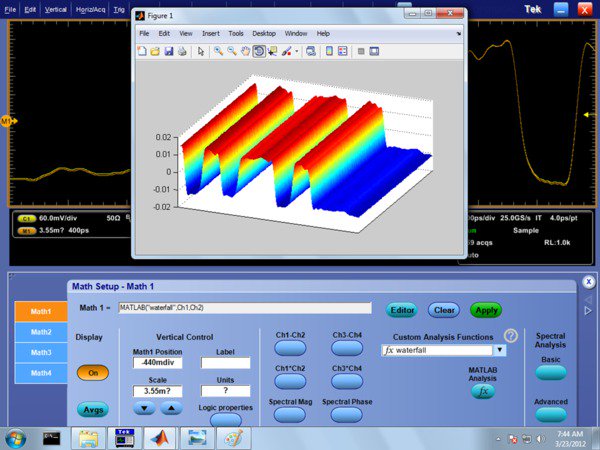
Custom analysis - Waterfall display generated from oscilloscope data using MATLAB.
Jitter analysis
Every MSO/DPO5000B Series oscilloscope includes the DPOJET Essentials jitter and eye pattern analysis software package, extending the oscilloscope's measurement capabilities to take measurements over contiguous clock and data cycles in a single-shot real-time acquisition. This enables measurement of key jitter and timing analysis parameters such as Time Interval Error and Phase Noise to help characterize possible system timing issues. Analysis tools such as plots for time trends and histograms quickly show how timing parameters change over time, and spectrum analysis quickly shows the precise frequency and amplitude of jitter and modulation sources.
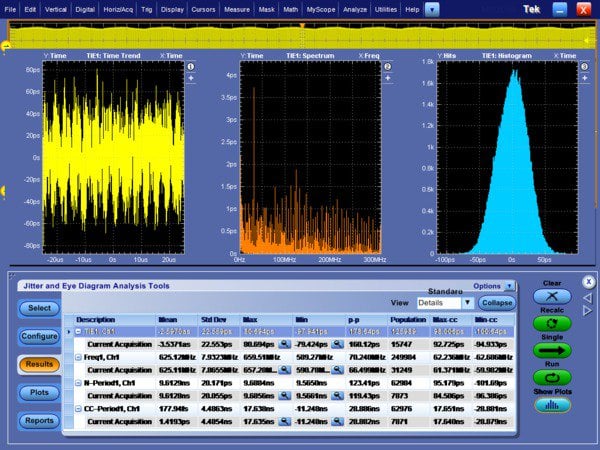
Jitter analysis - TIE jitter/timing analysis of 622 Mb/s signal
Extend jitter/timing analysis with the optional DPOJET Advanced software package (Option DJA). DPOJET Advanced adds advanced tools such as Rj/Dj separation, eye diagram masks, and Pass/Fail limits for conformance testing. DPOJET Advanced is also a measurement framework that works with standards-specific compliance test packages for applications such as DDR memory and USB 2.0.
Power analysis (optional)
The optional power analysis software package (Option PWR) enables quick and accurate analysis of power quality, switching loss, harmonics, magnetic measurements, safe operating area (SOA), modulation, ripple, amplitude and timing measurements, and slew rate (di/dt, dv/dt). Automated, repeatable power measurements are available with a touch of a button; no external PC or complex software setup is required. The package includes a report generation tool to automatically create detailed reports to document your measurement results.
Automated power measurements enable quick and accurate analysis of common power parameters.
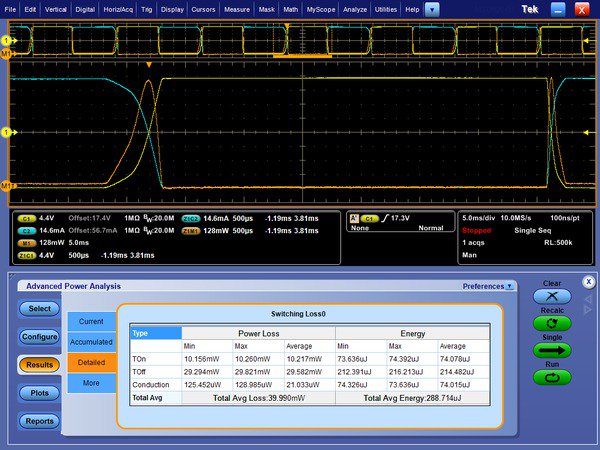
Switching Loss measurements.
DDR memory bus analysis (optional)
The optional DDR memory analysis software package (Option DDRA) automatically identifies DDR1, DDR2, LP-DDR, and LP-DDR2 Reads and Writes and makes JEDEC conformance measurements with Pass/Fail results on all edges in every Read and Write burst, perfect for debugging and troubleshooting DDR memory buses. Also provided are common measurements of clock, address, and control signals. Used with DPOJET (Option DJA), Option DDRA is the fastest way to debug complex memory signaling issues.
Vector signal analysis (optional)
The optional SignalVu™ vector signal analysis package (Option SVE) easily validates wideband designs and characterizes wideband spectral events. By combining the signal analysis engine of Tektronix real-time spectrum analyzers with the wide bandwidth acquisition of Tektronix digital oscilloscopes, you can now evaluate complex baseband signals directly on your oscilloscope. You get the functionality of a vector signal analyzer, a spectrum analyzer, and the powerful trigger capabilities of a digital oscilloscope - all in a single package. Whether your design validation needs include wideband radar, high data-rate satellite links, or frequency hopping communications, SignalVu™ vector signal analysis software can speed your time-to-insight by showing you time-variant behavior of these wideband signals.
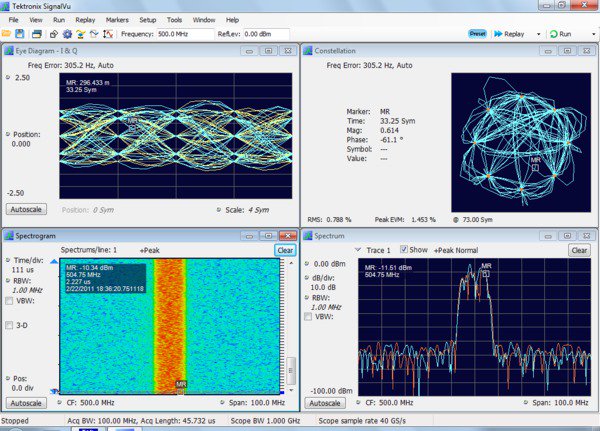
SignalVu™ enables detailed analysis in multiple domains.
Protocol triggering and analysis (optional)
On a serial bus, a single signal often includes address, control, data, and clock information. This can make isolating events of interest difficult. The MSO/DPO5000B Series offers a robust set of tools for debugging serial buses with automatic trigger and decode on I2C, SPI, CAN, LIN, FlexRay, RS-232/422/485/UART, MIL-STD-1553, Ethernet, and USB 2.0, and decode for 8b/10b, PCI Express, and MIPI D-PHY DSI-1 and CSI-2 serial buses.

Triggering on a USB full-speed serial bus. A bus waveform provides decoded packet content including Start, Sync, PID, Address, End Point, CRC, Data values, and Stop.
Serial triggering
Trigger on packet content such as start of packet, specific addresses, specific data content, unique identifiers, etc. on popular serial interfaces such as I2C, SPI, CAN, LIN, FlexRay, RS-232/422/485/UART, MIL-STD-1553, Ethernet, and USB 2.0.
Bus display
Provides a higher-level, combined view of the individual signals (clock, data, chip enable, etc.) that make up your bus, making it easy to identify where packets begin and end and identifying subpacket components such as address, data, identifier, CRC, etc.
Bus decoding
Tired of having to visually inspect the waveform to count clocks, determine if each bit is a 1 or a 0, combine bits into bytes, and determine the hex value? Let the oscilloscope do it for you! Once you've set up a bus, the MSO/DPO5000B Series will decode each packet on the bus, and display the value in hex, binary, decimal (USB only) or ASCII (USB and RS-232/422/485/UART only) in the bus waveform.
Event table display
In addition to seeing decoded packet data on the bus waveform itself, you can view all captured packets in a tabular view much like you would see in a software listing. Packets are time stamped and listed consecutively with columns for each component (Address, Data, etc.).
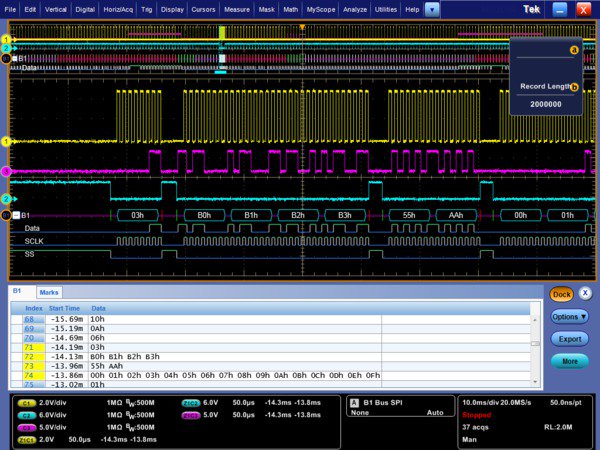
Event table showing decoded SPI serial packet data with bus timing waveform for a long acquisition.
Compliance testing
Serial bus compliance test (optional)
Software packages for automated compliance test are available for Ethernet 10BASE-T, 10BASE-Te, 100BASE-TX, and 1000BASE-T (Option ET3), MOST50 and MOST150 electrical (Option MOST), BroadR-Reach/100BASE-T1 and 1000BASE-T1 (Option BRR), and USB 2.0 (Option USB2) physical-layer devices. These software packages enable you to conduct testing using the standard's specified compliance tests.
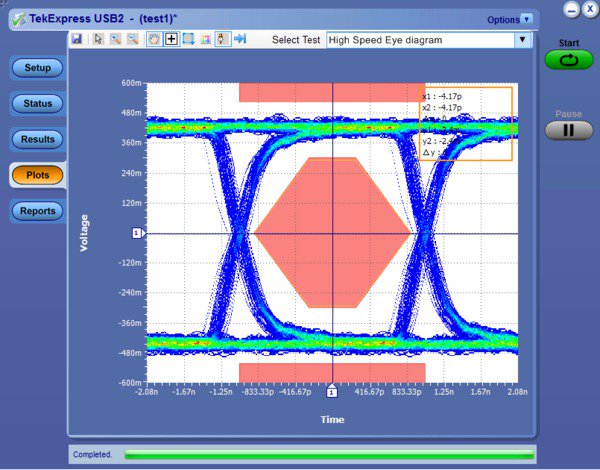
USB 2.0 Compliance Testing.
Mask testing
The optional mask test (Option MTM) software package is useful for long-term signal monitoring, characterizing signals during design, and production line testing. The mask test software includes a robust set of masks for telecommunications and computer standards for easily checking compliance to a standard. Additionally, custom masks can be created and used for characterizing signals. With mask testing you can tailor a test to your specific requirements by defining test duration in a number of waveforms, setting a violation threshold that must be met before considering a test a failure, counting hits with statistical information, and setting actions upon violations, test failure, and test complete.
Designed to make your work easier
Large, high-resolution touchscreen display
The MSO/DPO5000B Series features a 10.4 in. (264 mm) XGA color display with an integrated touch screen for seeing intricate signal details.

High resolution display quality with touch screen, mouse and stylus operation.
Dedicated front panel controls
Per-channel vertical controls provide simple and intuitive operation. No longer do you need to share one set of vertical controls across all four channels.
Floating licenses
Floating licenses offer an alternative method to manage your Tektronix asset. Floating licenses allow license-key enabled options to be easily moved among all your MSO/DPO5000, DPO7000, and DPO/DSA/MSO70000 Series of Tektronix oscilloscopes. Floating licenses are available for many license-key enabled options. To order a floating version of an option license add “DPOFL-“ prefix to the option name. (e.g. DPOFL-ET3)
Check www.tek.com for additional information about floating license options.
Easy data storage
Two USB 2.0 host ports on the front panel enable easy transfer of screenshots, instrument settings, and waveform data to a USB flash drive.
The rear panel contains four additional USB 2.0 host ports and a USB device port for controlling the oscilloscope remotely from a PC or for connecting USB peripherals. An integrated 10/100/1000BASE-T Ethernet port enables easy connection to networks and a Video Out port to drive an external monitor or projector. A standard ≥ 480 GB removable solid state disk drive makes customizing settings for different users easy and enables use in secure environments.
Connectivity and remote operation
There are many ways to connect to your MSO/DPO5000B Series oscilloscope to conduct extended analysis. The first makes use of the Windows Remote Desktop capability – connect directly to your oscilloscope and operate the user interface remotely through the built-in Remote Desktop. A second way to connect is through Tektronix OpenChoice® software which makes use of the fast embedded bus, transferring waveform data directly from acquisition to analysis applications on the Windows desktop at much faster speeds than conventional GPIB transfers.
Industry-standard protocols, such as TekVISA™ interface and ActiveX controls are included for using and enhancing Windows applications for data analysis and documentation. IVI-COM instrument drivers are included to enable easy communication with the oscilloscope using GPIB, serial data, and LAN connections from programs running on the instrument or an external PC. Or, use the Software Developer's Kit (SDK) to help create custom software to automate multistep processes in waveform collection and analysis with Visual BASIC, C, C++, MATLAB, LabVIEW, LabWindows/CVI, and other common Application Development Environments (ADE).
TekScope Anywhere™ off-line analysis
TekScope Anywhere™ brings the power of the oscilloscope analysis environment to the PC. Users now have the flexibility to perform analysis tasks including timing, eye, and jitter analysis outside the lab. Waveform data and setups1from Tektronix MDO3000, MDO4000, MSO/DPO5000, DPO7000C, or MSO/DPO70000C/D/DX/SX Series oscilloscopes can quickly be shared among team members and remote sites, resulting in improved efficiency.
1Setups for MSO/DPO5000/B, DPO7000C, MSO/DPO70000C/D/DX/SX models only.
Tektronix Mid-range Oscilloscopes
Need more performance or have other application needs? Consider the DPO7000, MDO4000, or MDO3000 series.
For more performance, the DPO7000C series offers:
- 500 MHz to 3.5 GHz bandwidth
- Up to 40 GS/s sampling rate
- Up to 500 M point record length
- 1 % accuracy
- More analysis and compliance support for higher data rates
- Microsoft Windows 10

For mixed-domain analysis or greater portability, the MDO4000 and MDO3000 series offer:
- 100 MHz to 1 GHz bandwidth
- Up to 5 GS/s sampling
- Up to 20 M point record length
- Serial data trigger and decode
- Built-in 3 GHz or 6 GHz spectrum analyzer (optional)
- 2 or 4 analog channels and 16 digital channels (optional)

Specifications
All specifications are guaranteed unless noted otherwise. All specifications apply to all models unless noted otherwise.
Model overview
MSO5034B DPO5034B | MSO5054B DPO5054B | MSO5104B DPO5104B | MSO5204B DPO5204B | ||
|---|---|---|---|---|---|
| Input Channels | 4 | ||||
| Bandwidth | 350 MHz | 500 MHz | 1 GHz | 2 GHz | |
| Rise Time (Calculated) | 1 ns | 700 ps | 350 ps | 175 ps | |
| DC Gain Accuracy | ±1.5%, derated at 0.10%/°C above 30 °C | ||||
| Bandwidth Limits | Depending on instrument model: 1 GHz, 500 MHz, 350 MHz, 250 MHz, and 20 MHz | ||||
| Effective Number of Bits (Typical) | 6 bits (10 divisionp-p sine wave input at instrument bandwidth, 100 mV/div, 50 Ω Input Impedance, maximum sample rate, 1 k point record length) | ||||
| Random Noise (RMS, typical, sample mode, full BW, 50 Ω) | |||||
| 1 mV/div | 173 μV | 178 μV | 68 μV | 70 μV | |
| 2 mV/div | 216 μV | 236 μV | 128 μV | 158 μV | |
| 5 mV/div | 231 μV | 281 μV | 214 μV | 307 μV | |
| 10 mV/div | 305 μV | 340 μV | 315 μV | 485 μV | |
| 20 mV/div | 504 μV | 523 μV | 547 μV | 791 μV | |
| 50 mV/div | 1.15 mV | 1.17 mV | 1.29 mV | 1.82 mV | |
| 100 mV/div | 2.40 mV | 2.46 mV | 3.08 mV | 4.75 mV | |
| 1 V/div | 22.96 mV | 22.98 mV | 23.15 mV | 29.58 mV | |
| Maximum Sample Rate (All channels) | 5 GS/s | 5 GS/s | 5 GS/s | 5 GS/s | |
| Maximum Sample Rate (1 or 2 channels) | 5 GS/s | 5 GS/s | 10 GS/s | 10 GS/s | |
| Maximum Equivalent Time Sampling Rate | 400 GS/s | ||||
| Maximum Record Length with Standard Configuration | 25 M | 25 M (4 ch) 50 M (1 or 2 ch) | |||
| Maximum Record Length with Option 5RL | 50 M | 50 M (4 ch) 125 M (1 or 2 ch) | |||
| Maximum Record Length with Option 10RL | 125 M | 125 M (4 ch) 250 M (1 or 2 ch) | |||
Vertical system analog channels
- Input coupling
- AC, DC
- Input resistance
- 1 MΩ ±1%, 50 Ω ±1%
- Input sensitivity range
1 MΩ: 1 mV/div to 10 V/div
50 Ω: 1 mV/div to 1 V/div
- Vertical resolution
- 8 bits (>11 bits with Hi Res)
- Maximum input voltage, 1 MΩ
300 VRMSCAT II, with peaks ≤ ±425 V
For <100 mV/div derate at 20 dB/decade above 100 kHz to 30 VRMSat 1 MHz, 10 dB/decade above 1 MHz
For ≥100 mV/div derate at 20 dB/decade above 3 MHz to 30 VRMSat 30 MHz, 10 dB/decade above 30 MHz
- Maximum input voltage, 50 Ω
- 5 VRMS, with peaks ≤ ±20 V
- Position range
- ±5 divisions
- Delay between any Two Channels (Typical)
≤100 ps (50 Ω, DC coupling and equal V/div at or above 10 mV/div)
- Offset range
- 1 mV/div - 50 mV/div
1 MΩ: ±1 V
50 Ω: ±1 V
- 50.5 mV/div - 99.5 mV/div
1 MΩ: ±0.5 V
50 Ω: ±0.5 V
- 100 mV/div - 500 mV/div
1 MΩ: ±10 V
50 Ω: ±10 V
- 505 mV/div - 995 mV/div
1 MΩ: ±5 V
50 Ω: ±5 V
- 1 V/div - 5 V/div
1 MΩ: ±100 V
50 Ω: ±5 V
- 5.05 V/div - 10 V/div
1 MΩ: ±50 V
50 Ω: NA
- Offset Accuracy
±(0.005 × |offset – position| + DC Balance)
Note: Both position and constant offset term must be converted to volts by multiplying by the appropriate volts/div term
- Channel-to-channel isolation (Any two channels at equal vertical scale settings) (typical)
≥100:1 at ≤100 MHz and ≥30:1 at >100 MHz up to the rated BW
Vertical system digital channels
- Input Channels
- 16 Digital (D15 - D0)
- Thresholds
- Per-channel Thresholds
- Threshold Selections
- TTL, ECL, User
- User-defined Threshold Range
±40 V
- Threshold Accuracy
- ±(100 mV + 3% of threshold setting)
- Maximum Input Voltage
- ±42 Vpeak
- Input Dynamic Range
30 Vp-p≤200 MHz
10 Vp-p>200 MHz
- Minimum Voltage Swing
- 400 mV
- Input Impedance
- 100 kΩ
- Probe Loading
- 3 pF
- Vertical Resolution
- 1 bit
Horizontal system analog channels
- Maximum Duration at Highest Real-Time Sample Rate
25 ms
- Time Base Range
- 12.5 ps/div to 8,000,000 s/div
- Time resolution (in ET/IT mode)
- 2.5 ps/div
- Time base delay time range
- –10 divisions to 1000 s
- Channel-to-channel deskew range
±75 ns
- Time base accuracy
- ±5 ppm over any ≥1 ms interval
Horizontal system digital channels
- Maximum Sample Rate (Main)
500 MS/s (2 ns resolution)
- Maximum record length (main)
25 M Standard
Up to 40 M with Record Length options
- Maximum sample rate (MagniVu)
16.5 GS/s (60.6 ps resolution)
- Maximum record length (MagniVu)
10k points centered around the trigger
- Minimum detectable pulse width
1 ns
- Channel-to-channel skew (typical)
200 ps
- Maximum input toggle rate
500 MHz at minimum input swing; higher toggle rates can be achieved at higher amplitudes
Trigger system
- Main trigger modes
- Auto, Normal, and Single
- Trigger coupling
DC, AC, HF Rej (attenuates >50 kHz), LF Rej (attenuates <50 kHz), Noise Reject (reduces sensitivity)
- Trigger holdoff range
- 250 ns to 8 s
- Enhanced triggering
User-selectable; corrects the difference in timing between the trigger path and the acquired data (not available in FastAcq)
- Trigger jitter
≤100 fsRMSusing Enhanced Trigger
≤10 psRMSwithout Enhanced Trigger and in Fast Acq mode
≤100 psRMSfor non-Edge-type trigger modes
- Trigger sensitivity
- Internal DC coupled
For 1 MΩ: 1 mV/div to 4.98 mV/div: 0.75 div from DC to 50MHz, increasing to 1.3 div at instrument bandwidth ≥5 mV/div: 0.40 div from DC to 50 MHz, increasing to 1 div at instrument bandwidth
For 50 Ω (MSO5204, DPO5204, MSO5104, DPO5104): 0.40 div from DC to 50 MHz, increasing to 1 div at instrument bandwidth
For 50 Ω (MSO5054, DPO5054, MSO5034, DPO5034): 1 mV/div to 4.98 mV/div: 0.75 div from DC to 50MHz, increasing to 1.3 div at instrument bandwidth ≥5 mV/div: 0.40 div from DC to 50 MHz, increasing to 1 div at instrument bandwidth
- External (auxiliary input) 1 MΩ
200 mV from DC to 50 MHz, increasing to 500 mV at 250 MHz
- Trigger level range
- Any channel
- ±8 divisions from center of screen
- External (auxiliary input)
- ±8 V
- Line
- Fixed at about 50% of line voltage
- Trigger modes
- Edge
- Positive, negative, or either slope on any channel or front-panel auxiliary input. Coupling includes DC, AC, HF reject, LF reject, and noise reject
- Glitch
- Trigger on or reject glitches of positive, negative, or either polarity. Programmable glitch width is 4 ns minimum to 8 s maximum
- Runt
- Trigger on a pulse that crosses one threshold but fails to cross a second threshold before crossing the first again
- Width
- Trigger on width of positive or negative pulse either within or outside selectable limits (4 ns to 8 s)
- Timeout
- Trigger on an event which remains high, low, or either, for a specified time period (4 ns to 8 s)
- Transition
- Trigger on pulse edge rates that are faster or slower than specified. Slope may be positive, negative, or either
- Setup/Hold
- Trigger on violations of both setup time and hold time between clock and data present on any two input channels
- Pattern
Trigger when any logical pattern of signals goes false or stays true for specified period of time (4 ns to 1 s). Pattern (AND, OR, NAND, NOR) specified for all analog and digital input channels defined as High, Low, or Don't Care
- Parallel Bus
- Trigger on specified data value on defined parallel bus
- State
- Any logical pattern of analog channels and digital channels (MSO models) clocked by edge on another channel. Trigger on rising or falling clock edge
- Video
- Trigger on all lines, specific line number, odd, even, or all fields on NTSC, PAL, SECAM, and HDTV 480p/60, 576p/50, 875i/60, 720p/30, 720p/50, 720p/60, 1080/24sF, 1080i/50, 1080p/25, 1080i/60, 1080p/24, 1080p/25, 1080p/50, 1080p/60, Bi-level, Tri-level
- Trigger Sequences
Main, Delayed by Time, Delayed by Events. All sequences can include separate horizontal delay after the trigger event to position the acquisition window in time
- A/B Sequence Event Trigger Types
Edge
- Trigger Delay by Time
- 4 ns to 8 s
- Trigger Delay by Events
- 1 to 4,000,000 events
- Visual Trigger
Trigger on up to 8 user-specified areas, including rectangle, triangle, trapezoid, hexagon, and user-specified shapes on any of the analog channels
- I2C (Optional)
Provided as part of Opt. SR-EMBD. Trigger on Start, Repeated Start, Stop, Missing ACK, Address (7 or 10 bit), Data, or Address and Data on I2C buses up to 10 Mb/s
- SPI (Optional)
- Provided as part of Opt. SR-EMBD. Trigger on Slave Select, Idle Time, or Data (1-16 words) on SPI buses up to 10 Mb/s
- CAN (Optional)
Provided as part of Opt. SR-AUTO. Trigger on Start of Frame, Type of Frame (Data, Remote, Error, or Overload), Identifier, Data, Identifier and Data, EOF, Missing Ack, Bit Stuff Error, and CRC Error on CAN buses up to 1 Mb/s
- LIN (Optional)
Provided as part of Opt. SR-AUTO. Trigger on Sync, Identifier, Data, Identifier and Data, Wakeup Frame, Sleep Frame, and Error on LIN buses up to 1 Mb/s
- FlexRay (Optional)
Provided as part of Opt. SR-AUTO. Trigger on Indicator Bits (Normal, Payload, Null, Sync, Startup), Cycle Count, Header Fields (Indicator Bits, Identifier, Payload Length, Header CRC, and Cycle Count), Identifier, Data, Identifier and Data, End Of Frame, and Error on FlexRay buses up to 10 Mb/s
- MIL-STD-1553 (Optional)
Provided as part of Opt. SR-AERO. Trigger on Sync, Command Word, Status Word, Data Word, Idle Time, and Error on MIL-STD-1553 buses up to 1 Mb/s
- Ethernet (Optional)
Provided as part of Opt. SR-ENET. Trigger on Start of Packet, MAC Address, MAC Q-tag, MAC Length/Type, MAC Data, IP Header, TCP Header,
TCP/IPV4 Data, End of Packet, and FCS(CRC) Error on 10BASE-T and 100BASE-TX buses.
- RS-232/422/485/UART (Optional)
Provided as part of Opt. SR-COMP. Trigger on Start Bit, End of Packet, Data, and Parity Error up to 10 Mb/s
- USB 2.0 Low Speed: (Optional)
- Provided as part of Opt. SR-USB.
Trigger on Sync, Reset, Suspend, Resume, End of Packet, Token (Address) Packet, Data Packet, Handshake Packet, Special Packet, Error.
Token Packet Trigger – Any token type, SOF, OUT, IN, SETUP; Address can be specified for Any, OUT, IN, and SETUP token types. Address can be further specified to trigger on ≤, <, =, >, ≥, != a particular value, or inside or outside a range. Frame number can be specified for SOF token using Binary, Hex, Unsigned Decimal, and Don't Care digits.
Data Packet Trigger – Any data type, DATA0, DATA1; Data can be further specified to trigger on ≤, <, =, >, ≥, != a particular data value, or inside or outside a range.
Handshake Packet Trigger – Any handshake type, ACK, NAK, STALL.
Special Packet Trigger – Any special type, Reserved.
Error Trigger – PID Check, CRC5 or CRC16, Bit Stuffing.
- USB 2.0 Full Speed: (Optional)
- Provided as part of Opt. SR-USB.
Trigger on Sync, Reset, Suspend, Resume, End of Packet, Token (Address) Packet, Data Packet, Handshake Packet, Special Packet, Error.
Token Packet Trigger – Any token type, SOF, OUT, IN, SETUP; Address can be specified for Any, OUT, IN, and SETUP token types. Address can be further specified to trigger on ≤, <, =, >, ≥, != a particular value, or inside or outside a range. Frame number can be specified for SOF token using Binary, Hex, Unsigned Decimal, and Don't Care digits.
Data Packet Trigger – Any data type, DATA0, DATA1; Data can be further specified to trigger on ≤, <, =, >, ≥, != a particular data value, or inside or outside a range.
Handshake Packet Trigger – Any handshake type, ACK, NAK, STALL.
Special Packet Trigger – Any special type, PRE, Reserved.
Error Trigger – PID Check, CRC5 or CRC16, Bit Stuffing.
- USB 2.0 High Speed: (Optional)
- Provided as part of Opt. SR-USB.
Trigger on Sync, Reset, Suspend, Resume, End of Packet, Token (Address) Packet, Data Packet, Handshake Packet, Special Packet, Error.
Token Packet Trigger – Any token type, SOF, OUT, IN, SETUP; Address can be specified for Any, OUT, IN, and SETUP token types. Address can be further specified to trigger on ≤, <, =, >, ≥, != a particular value, or inside or outside a range. Frame number can be specified for SOF token using Binary, Hex, Unsigned Decimal, and Don't Care digits.
Data Packet Trigger – Any data type, DATA0, DATA1, DATA2, DATAM; Data can be further specified to trigger on ≤, <, =, >, ≥, != a particular data value, or inside or outside a range.
Handshake Packet Trigger – Any handshake type, ACK, NAK, STALL, NYET.
Special Packet Trigger – Any special type, ERR, SPLIT, PING, Reserved. SPLIT packet components that can be specified include:
Hub Address
Start/Complete – Don't Care, Start (SSPLIT), Complete (CSPLIT) Port Address
Start and End bits – Don't Care, Control/Bulk/Interrupt (Full-speed Device, Low-speed Device), Isochronous (Data is Middle, Data is End, Data is Start, Data is All)
Endpoint Type – Don't Care, Control, Isochronous, Bulk, Interrupt
Error Trigger – PID Check, CRC5, CRC16, Any.
Note: USB 2.0 High-speed triggering, decoding, and search only available on 1 GHz and 2 GHz models.
Acquisition system
- Acquisition modes
- Sample
- Acquire sampled values
- Peak detect
Captures narrow glitches as narrow as 100 ps (2 GHz and 1 GHz models) or 200 ps (500 MHz and 350 MHz models) at all real-time sampling rates
- Averaging
- From 2 to 10,000 waveforms included in average
- Envelope
Min-Max envelope reflecting Peak Detect data over multiple acquisitions
- Hi-Res
Real-time boxcar averaging reduces random noise and increases resolution
- Roll mode
Scrolls sequential waveform points across the display in a right-to-left rolling motion at sweep speeds slower than 50 ms/div. Up to 20 MS/s with a maximum record length of 10 M
- FastAcq®
FastAcq optimizes the instrument for analysis of dynamic signals and capture of infrequent events
- Maximum FastAcq waveform capture rate
>250,000 wfms/s on all 4 channels simultaneously
- Waveform database
Accumulate waveform database providing three-dimensional array of amplitude, time, and counts
- FastFrame™
Acquisition memory divided into segments; maximum trigger rate >310,000 waveforms per second. Time of arrival recorded with each event. Frame finder tool helps to visually identify transients
- Automated Search and Mark
Automatically mark events and document waveforms. Search positive/negative slopes or both, glitches, runts, pulse widths, transition rate, setup and hold, timeout, windows, or find any logic or state pattern, up to 8 different event types on any of the 4 analog channels. Search DDR Read or Write bursts with Opt. DDRA. Event table summarizes all found events. All events are time stamped in reference to trigger position. Stop acquisitions when an event is found
Waveform analysis
- Waveform measurements
- Cursors
Waveform and Screen
- Automatic measurements
53, of which 8 can be displayed on-screen at any one time. Measurements include: Period, Frequency, Delay, Rise Time, Fall Time, Positive Duty Cycle, Negative Duty Cycle, Positive Width, Negative Width, Burst Width, Phase, Positive Overshoot, Negative Overshoot, Peak-to-Peak, Amplitude, High, Low, Maximum, Minimum, Mean, Cycle Mean, RMS, Cycle RMS, Area, Cycle Area
- Eye-pattern measurements
Extinction Ratio (absolute, %, dB), Eye Height, Eye Width, Eye Top, Eye Base, Crossing %, Jitter (p-p, RMS, 6sigma), Noise (p-p, RMS), Signal/Noise Ratio, Cycle Distortion, Q-Factor
- Measurement statistics
- Mean, Minimum, Maximum, Standard Deviation
- Reference levels
User-definable reference levels for automatic measurements can be specified in either percent or units
- Gating
Isolate the specific occurrence within an acquisition to take measurements on, using either screen or waveform cursors
- Waveform histogram
A waveform histogram provides an array of data values representing the total number of hits inside a user-defined region of the display. A waveform histogram is both a visual graph of the hit distribution and a numeric array of values that can be measured. Sources – Channel 1, Channel 2, Channel 3, Channel 4, Ref 1, Ref 2, Ref 3, Ref 4, Math 1, Math 2, Math 3, Math 4
Types – Vertical, Horizontal
- Waveform histogram measurements
Waveform Count, Hits in Box, Peak Hits, Median, Maximum, Minimum, Peak-to-Peak, Mean (μ), Standard Deviation (sigma), μ +1sigma, μ +2sigma, μ +3sigma
- Waveform processing/math
- Arithmetic
Add, Subtract, Multiply, Divide waveforms and scalars
- Algebraic expressions
Define extensive algebraic expressions including waveforms, scalars, user-adjustable variables, and results of parametric measurements. Perform math on math using complex equations. e.g. (Integral (CH1 – Mean(CH1)) × 1.414 × VAR1)
- Math functions
Average, Invert, Integrate, Differentiate, Square Root, Exponential, Log10, Log e, Abs, Ceiling, Floor, Min, Max, Sin, Cos, Tan, ASin, ACos, ATan, Sinh, Cosh, Tanh
- Relational
- Boolean result of comparison >, <, ≥, ≤, ==, !=
- Frequency domain functions (FFT)
Spectral Magnitude and Phase, Real and Imaginary Spectra
- FFT vertical units
Magnitude: Linear, dB, dBm
Phase: Degrees, radians, group delay
- FFT window functions
Rectangular, Hamming, Hanning, Kaiser-Bessel, Blackman-Harris, Gaussian, Flattop2, Tek Exponential
- Waveform definition
- As an arbitrary math expression
- Filtering functions
User-definable filters. Users specify a filter containing the coefficients of the filter. Filter files provided
- Custom math functions
Custom MATLAB and .NET plug-ins can be included in the math waveform definition
- Mask function
A function that generates a waveform database pixmap from a sample waveform. Sample count can be defined
Software
- IVI driver
Provides a standard instrument programming interface for common applications such as LabVIEW, LabWindows/CVI, Microsoft .NET and MATLAB. IVI-COM standard
- LXI Class C web interface
Connect to the MSO/DPO5000B Series through a standard Web browser by simply entering the oscilloscope's IP address in the address bar of the browser. The web interface enables viewing of instrument status and configuration, as well as status and modification of network settings. All web interaction conforms to LXI Class C specification
Display system
- Display type
10.4 in. (264 mm) liquid-crystal active-matrix color display with touch screen
- Display resolution
- 1024 horizontal × 768 vertical pixels (XGA)
- Waveform styles
- Vectors, dots, variable persistence, infinite persistence
- Color palettes
Normal, green, gray, temperature, spectral, and user defined
- Display format
- YT, XY
Computer system
- Operating system
Microsoft Windows 10 Enterprise IoT Edition
- CPU
- Intel i5-4400E 2.7 GHz processor
- PC system memory
- ≥4 GB
- Solid state disk drive
Removable solid state disk drive, 512 GB
- Mouse
- Optical wheel mouse, USB interface
- Keyboard
Order 119-7083-xx for small keyboard; USB interface and hub
Input output ports
- USB 2.0 High-speed host ports
Supports USB mass storage devices, printers, keyboard, and mouse. Two ports on front and four ports on rear of instrument. Can be disabled individually
- USB 1.1 Full-speed device port
Rear-panel connector allows for communication/control of oscilloscope through USBTMC or GPIB (with a TEK-USB-488 adapter)
- LAN port
- RJ-45 connector, supports 10/100/1000BASE-T
- Video out port
DB-15 female connector, connect to show the oscilloscope display on an external monitor or projector. Support for extended desktop and clone mode
- Audio ports
- Miniature phono jacks
- Keyboard port
- PS/2 compatible
- Mouse port
- PS/2 compatible
- Auxiliary input
Front-panel BNC connector. Input impedance 1 MΩ. Max input 300 VRMSwith peaks ≤ ±425 V
- Auxiliary out (software switchable)
Trigger Out: A TTL compatible pulse when the oscilloscope triggers
Time Base Reference Out: A TTL compatible output of internal 10 MHz reference oscillator
- External reference in
Time base system can phase lock to an external 10 MHz reference (10 MHz ±1%)
- Probe compensator output
Front-panel pins
Amplitude: 2.5 V
Frequency: 1 kHz
- LAN eXtensions for Instrumentation (LXI)
- Class: LXI Class C
- Optional TekVPI® external power supply
- Required when total oscilloscope probe power usage exceeds 15 W.
- Output Voltage
- 12 V
- Output Current
- 5 A
- Power Consumption
- 50 W
Power source
- Power source voltage
- 100 to 240 V ±10%
- Power source frequency
45 Hz to 66 Hz (85 to 264 V)
360 Hz to 440 Hz (100 to 132 V)
- Power consumption
- 275 W maximum
Physical characteristics
- Dimensions
mm in. Height 233 9.16 Width 439 17.29 Depth 206 8.12
- Weight
kg lb. Net 6.7 14.9 Shipping 12.5 27.5
- Rackmount configuration
5U
- Cooling clearance
in. mm Top 0 0 Bottom 0 0 Left Side 2 51 Right Side 0 0 Front 0 0 Rear 2 51
EMC environmental and safety
- Temperature
- Operating
0 °C to +50 °C
- Nonoperating
- –20 °C to +60 °C
- Humidity
- Operating
8% to 90% relative humidity with a maximum wet-bulb temperature of 29 °C at or below +50 °C (upper limit de-rates to 20.6% relative humidity at +50 °C). Noncondensing
- Nonoperating
5% to 98% relative humidity with a maximum wet-bulb temperature of 40 °C at or below +60 °C (upper limit de-rates to 29.8% relative humidity at +60 °C). Noncondensing
- Altitude
- Operating
- 3,000 m (9,843 ft.)
- Nonoperating
- 9,144 m (30,000 ft.)
- Regulatory
- Electromagnetic compatibility
- 2004/108/EC
- Certifications
UL61010-1; CSA61010-1, EN61010-1; IEC 61010-1
Ordering information
DPO5000B models
- DPO5034B
350 MHz, 5 GS/s, 25 M record length, 4-channel digital phosphor oscilloscope
- DPO5054B
500 MHz, 5 GS/s, 25 M record length, 4-channel digital phosphor oscilloscope
- DPO5104B
1 GHz, 10/5 GS/s (2/4 ch), 50 M/25 M record length, 4-channel digital phosphor oscilloscope
- DPO5204B
2 GHz, 10/5 GS/s (2/4 ch), 50 M/25 M record length, 4-channel digital phosphor oscilloscope
MSO5000B models
- MSO5034B
350 MHz, 5 GS/s, 25 M record length, 4+16 channel mixed signal oscilloscope
- MSO5054B
500 MHz, 5 GS/s, 25 M record length, 4+16 channel mixed signal oscilloscope
- MSO5104B
1 GHz, 10/5 GS/s (2/4 ch), 50 M/25 M record length, 4+16 channel mixed signal oscilloscope
- MSO5204B
2 GHz, 10/5 GS/s (2/4 ch), 50 M/25 M record length, 4+16 channel mixed signal oscilloscope
Standard accessories
- TPP0500B
One passive voltage probe per analog channel (500 MHz, 10X, 3.9 pF) for 500 MHz and 350 MHz models
- TPP1000
- One passive voltage probe per analog channel (1 GHz, 10X, 3.9 pF) for 2 GHz and 1 GHz models
- 200-5130-xx
- Front cover
- 119-6107-xx
- Touch-screen stylus
- 071-298x-xx
- User Manual (please specify language when ordering)
- —
- Advanced Search and Mark, DPOJET Essentials, Visual Trigger and Search, and Limit Test all included standard
- —
- Accessory pouch
- —
- Mouse
- —
- Calibration Certificate documenting measurement traceability to National Metrology Institute(s), Z 540-1 Compliance and ISO9001
- —
- Power Cord (please specify power plug option when ordering)
- —
- One-year warranty
- P6616
- 16-channel logic probe for MSO Models
- 020-2662-xx
- Logic probe accessory kit for MSO Models
Options
- Record length options
Option MSO5034B
DPO5034B
MSO5054B
DPO5054B
MSO5104B
DPO5104B
MSO5204B
DPO5204B
Opt. 5RL 50 M/Ch 125 M max, 50 M/Ch Opt. 10RL 125 M/Ch 250 M max, 125 M/Ch
Advanced analysis options
| Option | Description |
|---|---|
| Opt. BRR | BroadR-Reach/100BASE-T1 and 1000BASE-T1 Compliance Testing (Requires TF-GBE-BTP and TF-BRR-CFD Test Fixtures) (Available on 1 GHz and 2 GHz models only.) |
| Opt. DDRA | DDR Memory bus analysis (Requires Opt. DJA) (Available on 1 GHz and 2 GHz models only.) |
| Opt. DJA | Jitter and Eye Analysis Tools – Advanced (DPOJET) |
| Opt. DJAN | DPOJET Noise, jitter, and eye analysis tools (Requires Opt. DJA) |
| Opt. CMENET3 | TekExpress Ethernet Automated 10/100/1000 BASE-T Solution (or purchase Opt. CMENET3A if you already have Opt. ET3) |
| Opt. ET3 | Ethernet compliance test (Requires TF-GBE-BTP or TF-GBE-ATP Ethernet Test Fixture) |
| Opt. MOST | MOST Essentials – Electrical compliance and debug test solution for MOST50 and MOST150 (Requires Opt. DJA) |
| Opt. MTM | Mask testing – ITU-T (64 Kb/s to 155 Mb/s) – ANSI T1.102 (1.544 Mb/s to 155 Mb/s) – Ethernet IEEE 802.3, ANSI X3.263 (125 Mb/s to 1.25 Gb/s) – SONET/SDH (51.84 Mb/s to 622 Mb/s) – Fibre Channel (133 Mb/s to 2.125 Gb/s) – Fibre Channel Electrical (133 Mb/s to 1.06 Gb/s) – USB (12 Mb/s to 480 Mb/s) – IEEE 1394b (491.5 Mb/s to 1.966 Gb/s) – Rapid I/O Serial (up to 1.25 Gb/s) – Rapid I/O LP-LVDS (500 Mb/s to 1 Gb/s) – OIF Standards (1.244 Gb/s) – CPRI, V4.0 (1.228 Gb/s) – Video (143.18 Mb/s to 360 Mb/s) |
| Opt. PWR | Power measurement and analysis |
| Opt. SR-AERO | Aerospace serial triggering and analysis (MIL-STD-1553). Enables triggering on packet-level information on MIL-STD-1553 buses and analytical tools such as bus views, packet decoding, search tools, and packet decode tables with time stamp information. Signal Inputs – Any Ch1 - Ch4 Recommended probing – Differential |
| Opt. SR-AUTO | Automotive serial triggering and analysis (CAN/LIN/FlexRay). Enables triggering on packet-level information on CAN, LIN, and FlexRay buses and analytical tools such as digital views of the signal, bus views, packet decoding, search tools, and packet decode tables with time stamp information. Signal Inputs – Any Ch1 - Ch4 (and any D0 - D15 on MSO models) Recommended probing – LIN: single-ended; CAN/FlexRay: differential |
| Opt. SR-COMP | Computer serial triggering and analysis (RS-232/422/485/UART) Enables triggering on packet-level information on RS-232/422/485/UART buses and analytical tools such as digital views of the signal, bus views, packet decoding, search tools, and packet decode tables with time stamp information. Signal Inputs – Any Ch1 - Ch4 (and any D0 - D15 on MSO models) Recommended probing – RS-232/UART: single ended; RS-422/485: differential |
| Opt. SR-DPHY | MIPI® D-PHY serial analysis. Enables analysis of MIPI DSI-1 and CSI-2 buses with analytical tools such as digital views of the signal, bus views, packet decoding, search tools, and packet decode tables with time stamp information. Signal Inputs – Any Ch1 - Ch4 Recommended probing – Differential |
| Opt. SR-EMBD | Embedded serial triggering and analysis (I2C, SPI) Enables triggering on packet-level information on I2C and 2-wire and 3-wire SPI buses and analytical tools such as digital views of the signal, bus views, packet decoding, search tools, and packet decode tables with time stamp information. Signal Inputs – I2C: Any Ch1 - Ch4 (and any D0 - D15 on MSO models); SPI: Any Ch1 - Ch4 (and any D0 - D15 on MSO models) Recommended probing – I2C, SPI: single ended |
| Opt. SR-ENET | Ethernet serial triggering and analysis (10BASE-T, 100BASE-TX) Enables triggering on packet-level information on Ethernet buses as well as analytical tools such as bus views, packet decoding, search tools, and packet decode tables with time stamp information. Signal Inputs – Any Ch1 - Ch4. Recommended probing – Differential |
| Opt. SR-USB | USB 2.0 serial triggering and analysis (LS, FS, HS) Enables triggering on packet-level content for low-speed, full-speed, and high-speed USB serial buses. Also enables analytical tools such as bus views, packet decoding, search tools, and packet decode tables with time stamp information for low-speed, full-speed, and high-speed USB serial buses. Signal Inputs – Low-speed and Full-speed: Any Ch1 - Ch4 (and any D0 - D15 on MSO models) for single ended, Any Ch1 - Ch4 for differential; High-speed: Any Ch1 - Ch4 Recommended probing – Low-speed and Full-speed: Single ended or differential; High-speed: Differential (USB high-speed supported only on 1 GHz and 2 GHz models.) |
| Opt. SSD | Additional customer-installable removable Solid State Drive with Microsoft Windows 10 OS, TekScope, and applications software installed |
| Opt. SVA | AM/FM/PM Audio Signal Analysis (Requires Opt. SVE) |
| Opt. SVE | SignalVu® Essentials – Vector signal analysis software |
| Opt. SVM | SignalVu® General Purpose Modulation Analysis (Requires Opt. SVE) |
| Opt. SVP | SignalVu® Advanced Signal Analysis (including pulse measurements) (Requires Opt. SVE) |
| Opt. SVT | SignalVu® Frequency and Phase Settling Time Measurements (Requires Opt. SVE) |
| Opt. SV26 | SignalVu® APCO P25 measurements (Requires Opt. SVE) |
| Opt. USB2 | USB 2.0 Automated Compliance Test Application (Requires TDSUSBF USB Test Fixture. 2 GHz bandwidth required for high-speed USB) |
| Opt. USBPWR | Automated compliance test solution for USB power adapters |
Bundle options
These bundled items must be purchased at the same time as the instrument purchase.
| Option | Description |
|---|---|
| Opt. PS2 | Power Solution Bundle: DPOPWR, THDP0200, TCP0030A, 067-1686-xx (Deskew fixture) |
| Opt. PS3 | Power Solution Bundle: DPOPWR, TMDP0200, TCP0020, 067-1686-xx (Deskew fixture) |
Floating options
Floating licenses offer an alternative method to manage your Tektronix asset. Floating licenses allow license-key enabled options to be easily moved among all your MSO/DPO5000, DPO7000, and DPO/DSA/MSO70000 Series Tektronix oscilloscopes. Floating licenses are available for the following license-key enabled options.
Checkhttp://www.tek.com/products/oscilloscopes/floatinglicensesfor additional information about floating license options.
| Option | Description |
|---|---|
| DPOFL-BRR | BroadR-Reach/100BASE-T1 and 1000BASE-T1 Compliance Testing (Requires TF-GBE-BTP and TF-BRR-CFD Test Fixtures) (Available on 1 GHz and 2 GHz models only) |
| DPOFL-DDRA | DDR Memory bus analysis (Requires Opt. DJA) (Available on 1 GHz and 2 GHz models only) |
| DPOFL-DJA | Jitter and Eye Analysis Tools – Advanced (DPOJET) |
| DPOFL-DJAN | DPOJET Noise, jitter, and eye analysis tools (Requires Opt. DJA) |
| DPOFL-CMENET3 | TekExpress Ethernet Automated 10/100/1000 BASE-T Solution (or purchase DPOFL-CMENET3A if you already have DPOFL-CMENET3A) |
| DPOFL-ET3 | Ethernet compliance testing (Requires TF-GBE-BTP or TF-GBE-ATP Ethernet test fixture.) |
| DPOFL-MOST | MOST Essentials – Electrical compliance and debug test solution (MOST50, MOST150) (Requires Opt. DJA) |
| DPOFL-MTM | Mask testing |
| DPOFL-PWR | Power measurement and analysis |
| DPOFL-SR-AERO | Aerospace serial triggering and analysis (MIL-STD-1553) |
| DPOFL-SR-AUTO | Automotive serial triggering and analysis (CAN/LIN/FlexRay) |
| DPOFL-SR-COMP | Computer serial triggering and analysis (RS-232/422/485/UART) |
| DPOFL-SR-DPHY | MIPI® D-PHY serial analysis |
| DPOFL-SR-EMBD | Embedded serial triggering and analysis (I2C, SPI) |
| DPOFL-SR-ENET | Ethernet serial triggering and analysis (10BASE-T and 100BASE-TX) |
| DPOFL-SR-PCIE | PCI Express serial analysis (Available on ≥1 GHz models only) |
| DPOFL-SR-USB | USB 2.0 serial triggering and analysis (LS, FS, HS) |
| DPOFL-SR-810B | 8b/10b serial analysis |
| DPOFL-SVA | SignalVu® AM/FM/PM/Direct Audio measurements (Requires Opt. SVE) |
| DPOFL-SVE | SignalVu® Essentials – Vector signal analysis software |
| DPOFL-SVM | SignalVu® General purpose modulation analysis (Requires Opt. SVE) |
| DPOFL-SVP | SignalVu® Pulse – Advanced signal analysis (Requires Opt. SVE) |
| DPOFL-SVT | SignalVu® Settling time measurements (Requires Opt. SVE) |
| DPOFL-SV26 | SignalVu® APCO P25 measurements (Requires Opt. SVE) |
| DPOFL-USB2 | USB 2.0 Automated Compliance Test Application (Requires TDSUSBF USB Test Fixture. 2 GHz bandwidth required for high-speed USB) |
| DPOFL-USBPWR | Automated compliance test solution for USB power adapters |
Power plug options
- Opt. A0
- North America power plug (115 V, 60 Hz)
- Opt. A1
- Universal Euro power plug (220 V, 50 Hz)
- Opt. A2
- United Kingdom power plug (240 V, 50 Hz)
- Opt. A3
- Australia power plug (240 V, 50 Hz)
- Opt. A5
- Switzerland power plug (220 V, 50 Hz)
- Opt. A6
- Japan power plug (100 V, 50/60 Hz)
- Opt. A10
- China power plug (50 Hz)
- Opt. A11
- India power plug (50 Hz)
- Opt. A12
- Brazil power plug (60 Hz)
- Opt. A99
- No power cord
User manual options
- Opt. L0
- English manual
- Opt. L1
- French manual
- Opt. L3
- German manual
- Opt. L5
- Japanese manual
- Opt. L7
- Simplified Chinese manual
- Opt. L8
- Traditional Chinese manual
- Opt. L9
- Korean manual
- Opt. L10
- Russian manual
Service options
- Opt. C3
- Calibration Service 3 Years
- Opt. C5
- Calibration Service 5 Years
- Opt. D1
- Calibration Data Report
- Opt. D3
- Calibration Data Report 3 Years (with Opt. C3)
- Opt. D5
- Calibration Data Report 5 Years (with Opt. C5)
- Opt. R3
- Repair Service 3 Years (including warranty)
- Opt. R5
- Repair Service 5 Years (including warranty)
Probes and accessories are not covered by the oscilloscope warranty and Service Offerings. Refer to the datasheet of each probe and accessory model for its unique warranty and calibration terms.
Upgrade options
To upgrade your MSO/DPO5000B Series oscilloscope, order DPO-UP and an option listed below. For example, to add option DDRA, DDR Memory Technology Analysis Package, order DPO-UP DDRA.
- To upgrade record length:
- RL25E
- From standard 25 M/channel configuration to Opt. 5RL configuration
- RL210E
- From standard 25 M/channel configuration to Opt. 10RL configuration
- RL510E
- From Opt. 5RL configuration to Opt. 10RL configuration
- To add a solid state hard disk drive:
- SSDE
Add an additional customer-installable removable Solid State Drive assembly with Microsoft Windows 7 OS, TekScope, and applications software installed
- To upgrade MSO/DPO5000B Series with:
- BRR
- Add Opt. BRR - BroadR-Reach/100BASE-T1 and 1000BASE-T1 Compliance Testing (Requires TF-GBE-BTP and TF-BRR-CFD Test Fixtures) (Available on 1 GHz and 2 GHz models only)
- DDRA
- Add Opt. DDRA (Requires Opt. DJA.) (Available on 1 GHz and 2 GHz models only)
- DJAE
Add Opt. DJA – Jitter and Eye Analysis Tools - Advanced (DPOJET)
- DJAN
- Add Opt. DJAN - DPOJET Noise, jitter, and eye analysis tools (Requires Opt. DJA)
- CMENET3
- Add Opt. CMENET3 - TekExpress Ethernet Automated 10/100/1000 BASE-T Solution (or purchase CMENET3A if you already have Opt. ET3)
- ET3
- Add Opt. ET3 – Ethernet Compliance Testing (Requires TF-GBE-BTP or TF-GBE-ATP Ethernet Test Fixture)
- MOST
Add Opt. MOST – MOST Essentials - Electrical Compliance and Debug Test Solution (MOST50, MOST150) (Requires Opt. DJA)
- MTM
- Add Opt. MTM – Mask Testing
- PWR
- Add Opt. PWR – Power Measurement and Analysis
- SR-AERO
Add Opt. SR-AERO – Aerospace Serial Triggering and Analysis (MIL-STD-1553)
- SR-AUTO
Add Opt. SR-AUTO – Automotive Serial Triggering and Analysis (CAN/LIN/FlexRay)
- SR-COMP
Add Opt. SR-COMP – Computer Serial Triggering and Analysis (RS-232/422/485/UART)
- SR-DPHY
Add Opt. SR-DPHY – MIPI D-PHY Serial Analysis (DSI-1, CSI-2)
- SR-EMBD
Add Opt. SR-EMBD – Embedded Serial Triggering and Analysis (I2C, SPI)
- SR-ENET
Add Opt. SR-ENET – Ethernet Serial Triggering and Analysis (10BASE-T and 100BASE-TX)
- SR-PCIE
Add PCI Express Serial Analysis (Available on ≥1 GHz models only.)
- SR-USB
Add Opt. SR-USB – USB 2.0 Serial Triggering and Analysis (LS, FS, HS)
- SR-810B
- Add 8b/10b Serial Analysis
- SVA
- Add SignalVu AM/FM/Direct Audio Measurements (Requires Opt. SVE)
- SVEE
Add Opt. SVE – SignalVu Essentials - Vector Signal Analysis Software
- SVM
Add SignalVu General-purpose Modulation Analysis (Requires Opt. SVE)
- To upgrade DPO5000B Series to MSO:
- MSOE
- Add 16 digital channels to a DPO5000B
Recommended accessories
- Accessories
- 077-0076-xx
- Service manual (PDF only)
- 077-0010-xx
- Programmer manual (PDF only)
- 077-0063-xx
- Performance verification and specifications manual (PDF only)
- TPA-BNC
- TekVPI-to-TekProbe BNC adapter
- TEK-DPG
- Deskew Pulse Generator
- TEK-USB-488
- GPIB-to-USB adapter
- HCTEK54
- Hard transit case
- RMD5000
- Rackmount kit
- 119-7275-xx
- Mini multimedia keyboard
- 119-8726-xx
TekVPI external power supply – Required when probe power usage exceeds 15 W. Power cord not included. Specify power cord when ordering.
- 020-3071-xx
- DPO Demo 3 board with dual-A to single-B USB cable
- NEX-HD2HEADER1
- Mictor connector to square pin adapter
- Test fixtures
- 067-1686-xx
- Probe Calibration / Power Deskew test fixture
- TDSUSBF
- Test fixture for use with Opt. USB2
- TF-BRR-CFD
Automotive Ethernet Compliance Clock Frequency Divider fixture
- TF-GBE-BTP
Basic test package for 10/100/1000BASE-T Ethernet tests
- TF-GBE-ATP
Advanced test package for 10/100/1000BASE-T Ethernet (includes 1000BASE-T jitter test channel cable)
- TF-GBE-EE
Additional test fixture for Energy Efficient Ethernet measurements. Order through Crescent Heart Software (http://www.c-h-s.com)
- Adapters
- P6701B
- Optical/Electrical converter (multi mode). Requires TekVPI® to TekProbe BNC adapter (TPA-BNC).
- P6703B
- Optical/Electrical converter (single mode). Requires TekVPI® to TekProbe BNC adapter (TPA-BNC).
1Notice to EU customers: This product is not updated to comply with the RoHS 2 Directive 2011/65/EU and will not be shipped to the EU. Customers may be able to purchase products from inventory that were placed on the EU market prior to July 22, 2017 until supplies are depleted. Tektronix is committed to helping you with your solution needs. Please contact your local sales representative for further assistance or to determine if alternative product(s) are available. Tektronix will continue service to the end of worldwide support life.
- Probes
Tektronix offers over 100 different probes to meet your application needs. For a comprehensive listing of available probes, please visit www.tek.com/probes.
- TPP0500B
500 MHz, 10X TekVPI® passive voltage probe with 3.9 pF input capacitance
- TPP1000
1 GHz, 10X TekVPI passive voltage probe with 3.9 pF input capacitance
- TPP0502
- 500 MHz, 2X TekVPI passive voltage probe
- TAP2500
- 2.5 GHz TekVPI active single-ended voltage probe
- TAP1500
- 1.5 GHz TekVPI active single-ended voltage probe
- TDP3500
3.5 GHz TekVPI differential voltage probe with ±2 V differential input voltage
- TDP1500
1.5 GHz TekVPI differential voltage probe with ±8.5 V differential input voltage
- TDP1000
1 GHz TekVPI differential voltage probe with ±42 V differential input voltage
- TDP0500
500 MHz TekVPI differential voltage probe with ±42 V differential input voltage
- TIVM1
Differential Probe; 1 GHz, Up to 50X, ±50 V, TekVPI, 3 Meter Cable
- TIVM1L
Differential Probe; 1 GHz, Up to 50X, ±50 V, TekVPI, 10 Meter Cable
- TIVH08
Differential Probe; 800 MHz, Up to 2500X, ±2.5 kV, TekVPI, 3 Meter Cable
- TIVH08L
Differential Probe; 800 MHz, Up to 2500X, ±2.5 kV, TekVPI, 10 Meter Cable
- TIVH05
Differential Probe; 500 MHz, Up to 2500X, ±2.5 kV, TekVPI, 3 Meter Cable
- TIVH05L
Differential Probe; 500 MHz, Up to 2500X, ±2.5 kV, TekVPI, 10 Meter Cable
- TIVH02
Differential Probe; 200 MHz, Up to 2500X, ±2.5 kV, TekVPI, 3 Meter Cable
- TIVH02L
Differential Probe; 200 MHz, Up to 2500X, ±2.5 kV, TekVPI, 10 Meter Cable
- TCP0150
- 20 MHz TekVPI 150 Ampere AC/DC current probe
- TCP0030A
- 120 MHz TekVPI 30 Ampere AC/DC current probe
- TCP0020
- 50 MHz TekVPI 20 Ampere AC/DC current probe
- TPP0850
- 2.5 kV, 800 MHz TekVPI high-voltage passive probe
- TRCP0300
- 30 MHz, 250 mA to 300 A, AC current probe
- TRCP0600
- 30 MHz, 500 mA to 600 A, AC current probe
- TRCP3000
16 MHz, 500 mA to 3000 A, AC current probe
- TMDP0200
- ±750 V, 200 MHz high-voltage differential probe
- THDP0200
- ±1.5 kV, 200 MHz high-voltage differential probe
- THDP0100
- ±6 kV, 100 MHz high-voltage differential probe
- P5100A
- 2.5 kV, 500 MHz, 100X high-voltage passive probe
Recommended software
- TekScopeNL-BAS
- TekScope Anywhere™ Waveform Analysis and Visualization Node locked license.
- TekScopeFL-BAS
- TekScope Anywhere™ Waveform Analysis and Visualization floating license.
- TekScopeNL-DJA
Advanced Jitter Analysis for TekScope Anywhere™ Node locked license.
- TekScopeFL-DJA
- Advanced Jitter Analysis for TekScope Anywhere™ floating license.
- GRL-USB-PD
- USB Power Delivery electrical compliance and decode.



